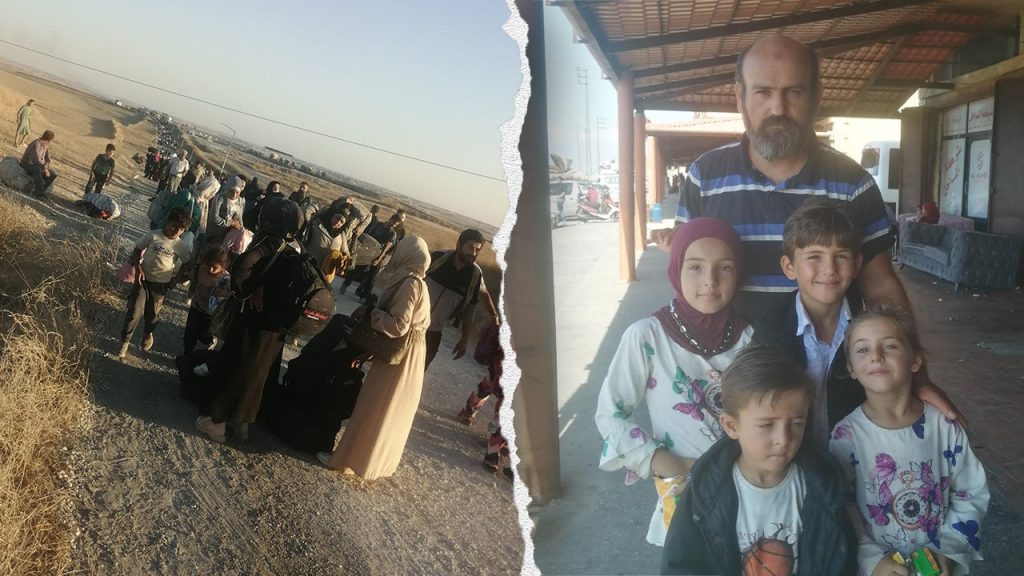Ahmed Yahia Dabbas, a 37-year-old father of four, fled Syria over a decade ago to escape the relentless bombardment inflicted by President Bashar al-Assad’s regime and its Russian allies. Resettling in the southern suburbs of Beirut, he worked as a doorman and built a new life, welcoming two boys and two girls into his family. However, as Israel escalated its military action in southern Beirut in late September, Dabbas’s home was destroyed, prompting the family to embark on a perilous journey back to Syria in search of safety. Tragically, Dabbas articulated that they sought refuge from war only to be met with danger again, commenting on the persistence of violence that haunted them even in Lebanon.
As Dabbas and his family attempted to return to Syria, they faced significant obstacles at numerous checkpoints controlled by the Assad regime along the Syria-Lebanon border. Many officials demanded bribes, forcing the family to pay to secure their passage through the checkpoints. After enduring five grueling days of travel, which included being subjected to abuse and insufficient food while trapped in a “no man’s land” near Aleppo, they finally managed to reach non-regime-held areas. Their struggles highlight the ongoing plight of countless displaced individuals who risk their lives escaping violent circumstances only to encounter new forms of hardship.
Upon their arrival in Aleppo, they initially sought refuge at a Free Syrian Army checkpoint and later relocated to the northern countryside of Idlib. Dabbas noted that numerous families, like his, had fled specifically to avoid arbitrary detainment and violence from the Assad regime, which is known for human rights abuses. Mouaz Moustafa from the Syrian Emergency Task Force emphasized the terrifying reality of certain Gulf Arab nations recognizing Assad’s regime, raising concerns about the safety of Syrian refugees who would be sent back to an extremely perilous situation.
The United Nations refugee agency reported that by early November, over 470,000 individuals, mostly Syrians and Lebanese, crossed from Lebanon into Syria due to Israeli military operations. These escalations followed attacks on Hezbollah leaders in retaliation for incursions since the Hamas attacks on October 7, further complicating the conflict landscape. Although a ceasefire was reached in late November, Dabbas and his family have opted to remain in Idlib, struggling to find stability and safety amidst ongoing bombardments and food shortages. Together with relatives displaced in 2014, the Dabbas family endures daily threats from the regime and allied forces, with Dabbas expressing a yearning for peace and an end to violence, even while finding joy in reuniting with family.
The situation in northwest Syria has only deteriorated post their return, with rising numbers of displaced persons and increasingly aggressive attacks by the Assad regime. The humanitarian crisis has deepened as the United Nations estimates that around 3.5 million people are internally displaced. Resilience among local organizations continues, yet they struggle under heavy demand and perilous conditions. The emergence of deadly drone attacks, particularly targeting residential zones, adds a new layer of complexity and fear for civilians, notably affecting the younger population who are denied a normal childhood due to constant threats of violence.
As winter approaches, humanitarian efforts are strained, with groups like the White Helmets seeking more international support to counter escalating attacks and assist vulnerable civilians, especially children. The haunting reality of displaced children proves troubling, with many lacking basic knowledge of home security and safety. The urgent call to action by rescue organizations highlights the dire need for a cessation of violence and a pathway for return to stability for those affected by the ongoing conflict. The plight of families like Dabbas’s serves as a stark reminder of the human cost of war, emphasizing the necessity of addressing and alleviating the suffering gripping Syria as larger geopolitical dynamics continue to unfold.

